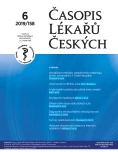-
Medical journals
- Career
Chronic secretory otitis media and tympanoplasty in children
Authors: Milan Urík; Ivo Šlapák; Josef Machač
Authors‘ workplace: Klinika dětské otorinolaryngologie LF MU a FN Brno
Published in: Čas. Lék. čes. 2019; 158: 240-242
Category: Review Article
Overview
The article presents the most frequent type of chronic middle ear inflammation in children and the middle ear surgery.
Middle ear reconstructions in childhood represent a complex issue. Their aim is to remove the pathological process in the middle ear and subsequently to restore the transfer function of the middle ear. Autologous and biocompatible materials can be used for reconstruction. Hearing gain is essential, especially in childhood, for the patient's further life. Good hearing in childhood is key for proper development of speech and learning. The quality of life, mental and language skills and children's development are thus positively influenced by the operation.
Even in childhood, these operations can achieve good results, both anatomical and functional.
Keywords:
surgery – reconstruction – hearing – chronic otitis media with effusion
Sources
- American Academy of Family Physicians; American Academy of Otolaryngology-Head and Neck Surgery; American Academy of Pediatrics Subcommittee on Otitis Media with Effusion. Otitis media with effusion. Pediatrics 2004; 113(5): 1412–1429.
- Roditi RE, Rosenfeld RM, Shin JJ. Otitis media with effusion: our national practice. Otolaryngol Head Neck Surg 2017; 157(2): 171–172.
- Chrobok V, Pellant A, Profant M. Cholesteatom spánkové kosti. Tobiáš, Havlíčkův Brod, 2008.
- Tos M. Manual of Middle Ear Surgery: approaches, myringoplasty, ossiculoplasty, tympanoplasty. Thieme, Stuttgart, 1993.
- Colletti V, Fiorino FG. Malleus-to-footplate prosthetic interposition: experience with 265 patients. Otolaryngol Head Neck Surg 1999; 120(3): 437–444.
- Demir UL, Caraca S, Basut O. Bone cement or incus interposition in type 2 tympanoplasty: prognostic factors and functional outcomes. Kulak Burun Bogaz Ihtis Derg 2012; 22(2): 99–104.
- Felek SA, Celik H, Islam A et al. Type 2 ossiculoplasty: prognostic determination of hearing results by middle ear risk index. Am J Otolaryngol 2010; 31(5): 325–331.
- Bluestone CD, Cantekin EI, Douglas GS. Eustachian tube function related to the results of tympanoplasty in children. Laryngoscope 1979; 89 : 450-458.
- Hong P, Arseneault T, Makki F. A long-term analysis of auricular position in pediatric patients who underwent post-auricular approaches. Int J Pediatr Otorhinolaryngol 2013; 78 : 471–473.
- Uyar Y, Keleş B, Koç S et al. Tympanoplasty in pediatric patients. Int J Pediatr Otorhinolaryngol 2006; 70(10): 1805–1809.
Labels
Addictology Allergology and clinical immunology Angiology Audiology Clinical biochemistry Dermatology & STDs Paediatric gastroenterology Paediatric surgery Paediatric cardiology Paediatric neurology Paediatric ENT Paediatric psychiatry Paediatric rheumatology Diabetology Pharmacy Vascular surgery Pain management Dental Hygienist
Article was published inJournal of Czech Physicians

-
All articles in this issue
- Inner ear disorders
- Updating the nationwide methodology for hearing screening of newborns in the Czech Republic
- Implantable bone conduction hearing systems
- Cochlear Implantation
- Differential diagnosis of ear pain
- Chronic inflammation of the middle ear with cholesteatoma
- Chronic secretory otitis media and tympanoplasty in children
- Diagnostics of retrocochlear hearing loss
- Tumors of the temporal bone
- . Respiratory epithelial adenomatoid hamartoma – typical but underdiagnosed pathology of nasal cavity and sinuses
- The motivation of nurses at departments of internal medicine
- Journal of Czech Physicians
- Journal archive
- Current issue
- Online only
- About the journal
Most read in this issue- Tumors of the temporal bone
- Differential diagnosis of ear pain
- Chronic inflammation of the middle ear with cholesteatoma
- Inner ear disorders
Login#ADS_BOTTOM_SCRIPTS#Forgotten passwordEnter the email address that you registered with. We will send you instructions on how to set a new password.
- Career

